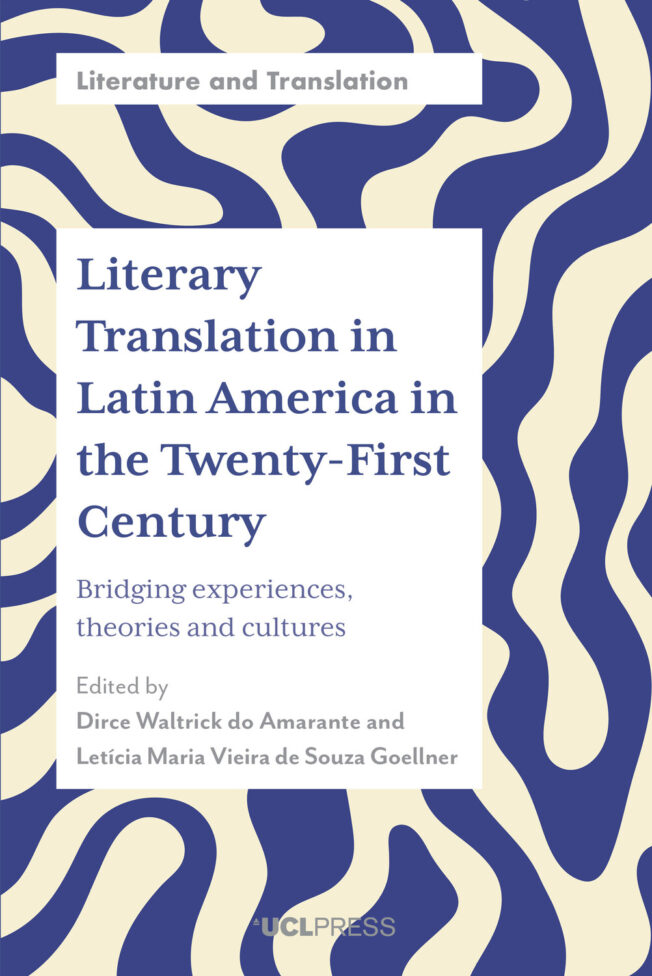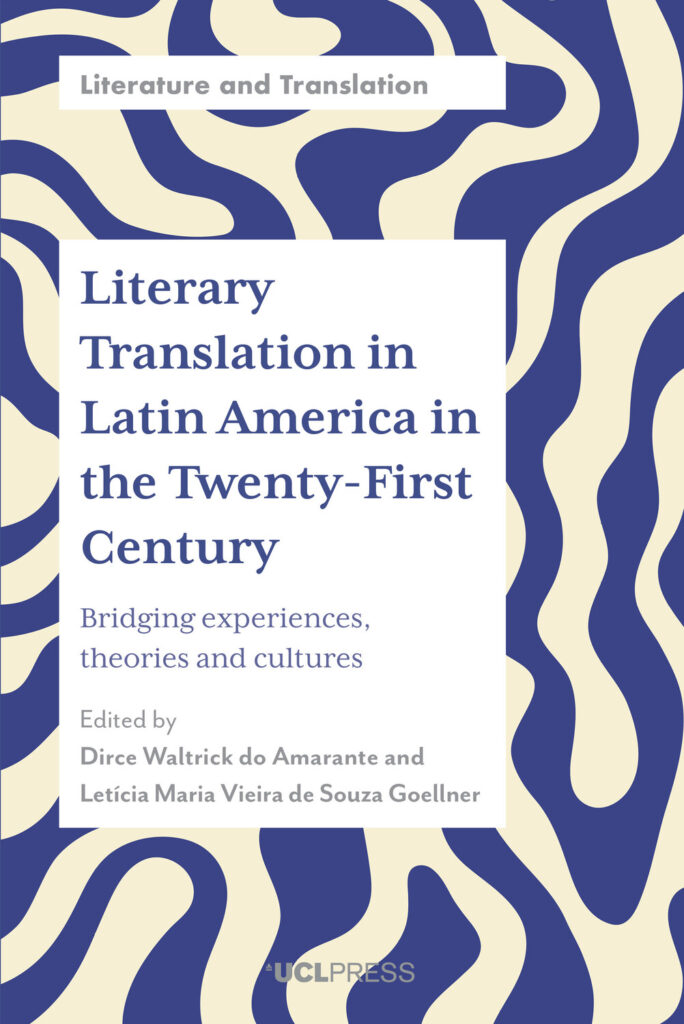
Literary Translation in Latin America in the Twenty-First Century
Bridging experiences, theories and cultures
Dirce Waltrick do Amarante (Editor), Letícia Maria Vieira de Souza Goellner (Editor)
Series: Literature and Translation
Literary Translation in Latin America in the Twenty-First Century provides an in-depth exploration of the current landscape of literary translation studies and translation practices across Latin America. The unparalleled linguistic diversity of Latin America, with nearly 500 languages spoken, makes translation a vital aspect of daily life, which in turn fosters a dynamic field of literary experimentation, attracting intense scholarly inquiry unique to the region. This rich linguistic mosaic includes the colonial legacies of Spanish and Portuguese; European languages that persist in Brazil, such as East Pomeranian; African languages such as Kimbundu and Yoruba, incorporated into standard Portuguese and used in religious practices; as well as indigenous languages including Quechua and Guarani. Furthermore, in a region where Spanish and Portuguese are predominant, translation is pivotal not only for facilitating internal communication, but also for engaging with global cultures.
This volume argues that translation in Latin America is not only an academic exercise but a vital, everyday practice that facilitates dialogue within the region, as well as with the wider world. It emphasises that the practice of translators, and the methods of scholars are not limited to established theories, but require innovative practices and methods to explore lesser-known traditions, and to merge orthodox studies with the cultural insights of Indigenous peoples.
List of figures and tables
List of contributors
Preface
Acknowledgements
1 Godô Divaga…/ Godô Wanders…/ Godê Divaga
Donaldo Schüler
Part I: Political issues/activism/extra-Western cultures
2 Translation as a form of heresy: the Argentinean rendition of Gloria Anzaldúa’s posthumous book
María Laura Spoturno
3 Resistance and performance: translating the poems of the Chilean artist Cecilia Vicuña
Dirce Waltrick do Amarante
4 Territorial translation in contemporary Quechua poetry: the role of the Llaqta in Dida Aguirre’s Jarawi
Christian Elguera Olortegui
5 On translation and Andean care with the dead
Evelyn Martina Schuler Zea
6 Cultural translation as equivocal poetics
Álvaro Faleiros
7 Maino I, Mainomby: the messenger hummingbird in the translation of Avyu Rapyta
Joana Vangelista Mongelo (Parapoty) and Mary Anne Warken
Part II: Theoretical/linguistic/philosophical issues
8 Poetic forms and translation of poetry: recreating meaning and experience
Andrés Claro
9 Partext, parart
Sérgio Medeiros
10 Vertigo in a spiral or reflections on the translation of Paul Celan’s aphorisms
Marcelo Ariel
11 João Simões Lopes Neto, representative of the Brazilian Gauchesca
Román García Arrospide
12 Counterfeiters
Myriam Ávila
13 Translation as the creation of a language Douglas Diegues
14 The translator as a ventriloquist
Iván García
15 Translating novels and essays: strategies involved
Martha Lucía Pulido Correa
Part III: Practical issues in literary translation
16 The art of frightening/astonishing translations
Jerónimo Pizarro
17 Fragments on Clarice Lispector’s The Passion According to G.H. and translation as a profane enlightenment
Gonzalo Aguilar
18 Different strategies in the process of rewriting children’s books: the translations of Reinações de Narizinho by Monteiro Lobato from Portuguese into Spanish, English and German’
Letícia Goellner, Vicente Menares, and Belén Rodríguez Salvatierra
Index
DOI: 10.14324/111.9781806550951
Number of illustrations: 5
Publication date: 01 June 2026
PDF ISBN: 9781806550951
EPUB ISBN: 9781806550968
Hardback ISBN: 9781806550937
Paperback ISBN: 9781806550944
Dirce Waltrick do Amarante (Editor) 
Dirce Waltrick do Amarante is Professor of Performing Arts and in the Graduate Program in Literature at the Federal University of Santa Catarina. She is also Professor in the Graduate Translation Program at University of Brasília. She was awarded the Boris Schnaiderman Prize for Best Translation (James Joyce) in 2019 and the Jabuti Prize in the Translation category for the collective translation of Finnegans Wake in 2023. Waltrick do Amarante has authored books on literary theory, theatre, children’s literature, three books of short stories and two plays.
Letícia Maria Vieira de Souza Goellner (Editor) 
Letícia Maria Vieira de Souza Goellner is Assistant Professor and Director of the Postgraduate Certificate in Literary Translation at Pontificia Universidad Católica de Chile. She holds a PhD in Translation Studies from Universidade Federal de Santa Catarina and has been a postdoctoral fellow at Universidade de Brasília. Her most recent publication, Damas y Doncellas: Una mirada feminista de fines del siglo XIX (Ladies and Maidens: A feminist perspective from the late 19th Century) (2024), is a collection of translated literary essays by Brazilian writer Júlia Lopes de Almeida.
Literary Translation in Latin America in the Twenty-First Century
Dirce Waltrick do Amarante, Letícia Maria Vieira de Souza Goellner,
01 June 2026
Translation Studies before ‘Translation Studies’
Kathryn Batchelor, Iryna Odrekhivska,
15 January 2026
Inclusion, Diversity and Innovation in Translation Education
Alejandro Bolaños García-Escribano, Mazal Oaknín, Olga Castro,
01 October 2024
Contemporary Afro-Brazilian Short Fiction
Ana Cláudia Suriani da Silva, Julio Ludemir, Maria Aparecida Andrade Salgueiro,
03 September 2024
The Bankruptcy
Júlia Lopes de Almeida, Ana Cláudia Suriani da Silva, Cintia Kozonoi Vezzani, Jason Rhys Parry,
17 July 2023
Poems of Guido Gezelle
Paul Vincent MA, MTA FCIoL, Honorary Senior Lecturer, Department of Dutch, UCL,
14 November 2016
Herman Gorter: Poems of 1890
Herman Gorter, Paul Vincent MA, MTA FCIoL, Honorary Senior Lecturer, Department of Dutch, UCL,
01 October 2015
Literary Translation in Latin America in the Twenty-First Century
Bridging experiences, theories and cultures
Literary Translation in Latin America in the Twenty-First Century provides an in-depth exploration of the current landscape of literary translation studies and translation practices across Latin America. The unparalleled linguistic diversity of Latin America, with nearly 500 languages spoken, makes translation a vital aspect of daily life, which in turn fosters a dynamic field of literary experimentation, attracting intense scholarly inquiry unique to the region. This rich linguistic mosaic includes the colonial legacies of Spanish and Portuguese; European languages that persist in Brazil, such as East Pomeranian; African languages such as Kimbundu and Yoruba, incorporated into standard Portuguese and used in religious practices; as well as indigenous languages including Quechua and Guarani. Furthermore, in a region where Spanish and Portuguese are predominant, translation is pivotal not only for facilitating internal communication, but also for engaging with global cultures.
This volume argues that translation in Latin America is not only an academic exercise but a vital, everyday practice that facilitates dialogue within the region, as well as with the wider world. It emphasises that the practice of translators, and the methods of scholars are not limited to established theories, but require innovative practices and methods to explore lesser-known traditions, and to merge orthodox studies with the cultural insights of Indigenous peoples.

